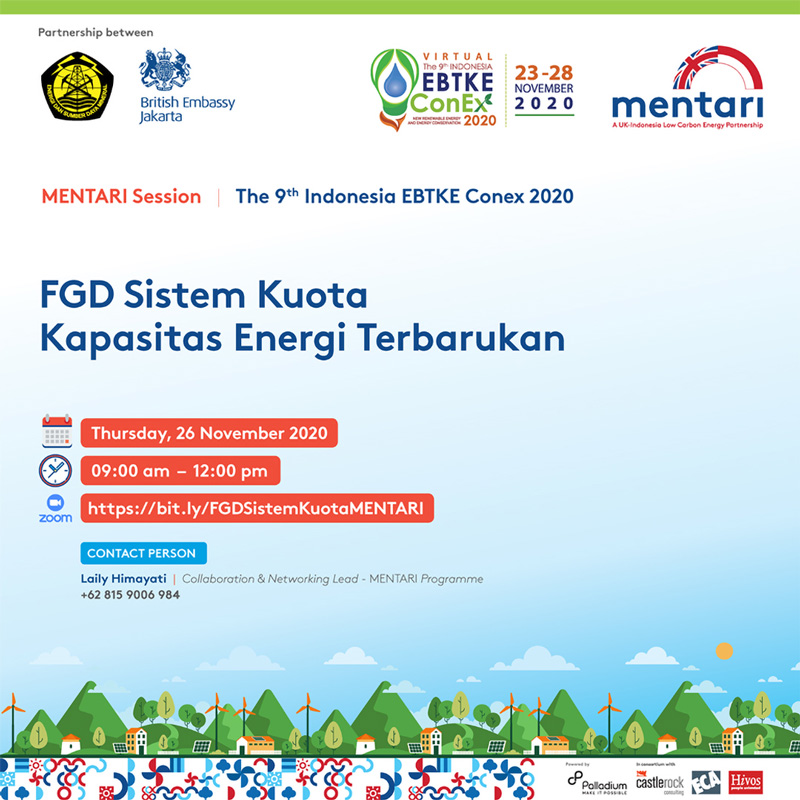MENTARI Persiapkan BUMDes Berkelanjutan untuk Mengelola PLTS di Mata Redi
Jakarta, 25 November 2020 – The MENTARI program (Menuju Transisi Energi Rendah Karbon Indonesia/Towards Indonesia’s Low Carbon Energy Transition) is currently preparing an example of a sustainable Village-Owned Enterprise (Badan Usaha Milik Desa/BUMDes) specifically for the management of solar power plants), in Mata Redi Village, Central Sumba, East Nusa Tenggara. This is done as part of the demonstration component of the MENTARI Program project, one of which is the capacity building of BUMDes for Renewable Energy.
The BUMDes we are preparing to prepare are not energy providers, but we will introduce new BUMDes terminology as an entrepreneurship hub, so we will form BUMDes to have businesses related to creative business, “explained Dedy Haning, Head of the MENTARI Demonstration Program, at the Focused Discussion Webinar on Village-Owned Enterprises as a Model for Sustainable Small-Scale Renewable Energy Management, in Jakarta (25/11).
This activity is one of the sessions held by the MENTARI Program as a sight event in the Indo EBTKE ConEX 2020 series of activities. The MENTARI program is a program in collaboration with the Ministry of Energy and Mineral Resources and the British Embassy Jakarta, with the aim of encouraging the development of renewable energy in Indonesia. One of which is within the MENTARI’s scope of work is the support for increasing policies in the field of renewable energy, both on grid and off grid, in order to increase the target of the renewable energy mix as stated in the national energy general plan in accordance with Presidential Regulation No. 22 of 2017, namely 23% of the renewable energy mix by 2025.
This discussion was guided by Fabby Tumiwa, Director of the Institute Essential Services Reforms (IESR) and featured several speakers, namely, Dr. Haryanto who represented the Directorate General of New and Renewable Energy and Energy Conservation to deliver his remarks, as well as a number of renewable energy responders from Aqua, UNDP, the Director General of Electricity and other renewable energy practitioners.
Dedy added, in order to support the creative economy of BUMDes, MENTARI has identified the potential for industrial creative derivatives from Mata Redi Village, and will ensure its assistance, both technically and non-technically. They will also include village youths who apparently also graduated from high school and university in technical rights related to photovoltaics (PV).
“Mata Redi was chosen based on a broader study, namely the study of social economics, especially economic and social studies for local products in certain villages, including Mata Redi. It just happens that Mata Redi gets the highest score from various aspects that have been considered,” Dedy explained.
Dedy sees a lot of potential to develop BUMDes in Mata Redi. This can increase new skills for the people who will be involved, such as electricity skills, orientation and mobility skills and so on. This includes job opportunities for rural communities, capital participation from villages, new business lines and new income for BUMDes.
“Although there are also many challenges because it requires a business area, increasing the capacity of BUMDes will definitely take time, then investing if there is an increase in load demand, it becomes a question of how we arrange for cooperation with the private sector, or if BUMDes has the financial capacity to do that, ” added Dedy.
MENTARI has finished conducting a Pre-feasability study and is now continuing to provide assistance in preparation for BUMDes with various trainings. Mata Redi itself is located on the edge of the Manupeu National Park, in Central Sumba. It is considered strategic because it is not far from the capital city of Waikabubak district and the capital of Central Sumba district itself. However, to install on-grid, the State Electricity Company (Perusahaan Listrik Negara/PLN)finds it very difficult to enter the village, even within the next five years. MENTARI will later ensure that as many as 220 households, including an additional one hamlet, namely Mata Woga with 25 houses, will be served.
“We have finished carrying out the baseline and feasibility studies, currently we are completing a more in-depth feasibility study to determine the best delivery model for Mata Redi. Due to COVID-19 restrictions, baseline and feasibility studies are carried out with limitations. So, we deploy drones to take more specific images in these limited conditions. Therefore, the process is a bit longer than usual. Meanwhile BUMDes has been included in the Village Government Work Plan for 2021 to be built in 2021, “explained Dedy.
Dedy also added that the Central Sumba District Government itself has committed to support this program, and has issued a District Head Decree for the Village Economic Development Model Inclusive Village through the provision of renewable energy to increase traction from programs funded by the Regional Revenue and Expenditure Budget. In order to prepare for this, MENTARI is still working on increasing capacity and providing assistance in the next three years.
Operational Options
Responding to the explanation regarding BUMDes Mata Redi, Wahid Tinto, an electricity practitioner explained, if the first option is to be chosen, BUMDes must be a limited liability company and must have a subsidiary business line.
“So BUMDes is the umbrella, then there are other companies, companies that are micro independent power producer (IPP), there are companies that have various kinds of savings and loans. This means that if you want to become an IPP, you must become a company. After becoming an IPP, then it must have a certification, the workers must be certified and the institution must be a business entity. It is a long process but it is there and it is very much defined here. If you do choose the first option, BUMDes will not only become BUMDes anymore, but have turned into an IPP,” Tinto responded.
Meanwhile Amelia, a representative from Akuo Energy Indonesia, recalled their experience in Kalimantan with MCA Indonesia, where the most challenging things were during operation and management. Even after that, sustainability was difficult.
“The proceeds from the sale of electricity cannot yet cover if, for example, there is a maintenance issue that is corrective action rather than preventive action. Even issues that are preventive action cannot be covered, because to pay, for example, if we want to hire a sub-contractor, there is not enough money and we are located in a remote area whereas the sub-contractor cost is more than usual. So we encourage the operator to be able to run it himself. So, indeed we involved PLN from the start, which in my opinion, is an option that can maintain sustainability. Regardless of the form of involvement, it might be like the first option or the second option. It is also possible that the power plant is owned by BUMDes, while the distribution network still belongs to PLN. So, the sale of electricity is also legal, “said Amelia.
At the conclusion of the discussion, Fabby Tumiwa provided several solutions related to the proposed options, especially in the first option regarding the guarantee of tariffs and subsidies. Because according to Fabby, someday it will support BUMDes’ revenue. Second, related to electricity in the village, according to Fabby, it cannot be separated from building the capacity or developing the potential of the local village so that the available electricity or available energy can be optimally utilized for productive activities that will increase community income. With the increase in people’s income, it is hoped that they will be able to more easily pay for the energy they use.
“So it is not easy to increase tariffs because there are other roles of BUMDes here, so that the role of BUMDes is not just providing or selling electricity. But you also have to think about other businesses that can support the sustainability of the BUMDes. Also, the sustainability aspect is not only calculated from the income, but also from the supporting environment, the talents in the community, and the businesses they manage will also be very decisive, “said Fabby.
Furthermore, Fabby also provided input on support so that BUMDes can be more sustainable, namely with the support programs that have been provided by the Ministry of Villages for the 2021-2024 budget as a BUMDes strengthening program. So that in the future, BUMDes programs will be the “spearhead” for the provision of renewable energy in order to support the target of achieving 23 percent electrification. (Musfarayani/MENTARI)







